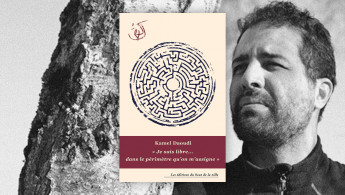'I am free within the perimeter assigned to me': The tale of Kamel Daoudi, France's longest-serving house arrest prisoner
On April 24, 2023, Kamel Daoudi celebrated a bitter anniversary. He'd been under house arrest for the last 15 years.
Having spent over six years in prison, Kamel’s freedom has been either totally or substantially restricted for almost half of his life. His troubling story has now been told in a book he authored, published in May 2022 titled I Am Free… Within The Perimeter Assigned To Me.
Consisting of a series of thematic chapters commenting on his experiences, the text sheds a comprehensive light on a case of dehumanising confinement, while describing his account of France’s response to the War on Terror.
The shadows of the past
"The strangeness of the foreigner who never wanted to assimilate to the values of pax occidentalis"
Born on August 3, 1974, in Sedrata, Algeria, Kamel moved to France as a five-year-old child and has lived in France since. A young adult who graduated in IT and mechanical engineering in the 90s, Kamel says he "struggled in a country infected with systemic racism."
Despite his degrees, his professional career was unsuccessful "due to France’s rejection of his Algerian identity" which he believes prevented him from attaining financial stability for years.
But the deeper conflict lay in a legitimate identity crisis accompanying his coming-of-age years.
|
The 'ideal culprit'
"After the 9/11 attacks, I was erected as the ideal culprit. The figure of the suspicious bearded monster whose malignant intelligence left no room for doubt"
In 2001, Kamel says he went to Pakistan and Afghanistan to learn about his faith. He resided in Jalalabad for a few months and returned to France by the summer.
The War on Terror started only a few weeks after, drastically shifting the West’s perspectives vis-à-vis the Muslim subject.
Paranoid suspicion, punishment and control now shaped how nation-states addressed Muslims.
He writes about his decision to leave for the UK, fearful that his past acquaintance with a Muslim detained and tortured in the UAE — Djamel Beghal — might lead to his arrest in France.
He was nonetheless arrested and sent back to his adoptive country. Once there, authorities used the excessively broad range of their anti-terror legislation to drag him into the case of Beghal. The latter was accused of and sentenced for plotting the destruction of the US embassy based on testimonies he gave under severe torture and abuse.
Concomitantly, Kamel was convicted of “criminal association in relation to a terrorist undertaking” — an imprecise charge severely criticised by human rights organisations.
He was stripped of his French citizenship and banned from French territory, meaning he would be expelled once his sentence was served.
His short residence in a Muslim country now torn by war, his spiritual quest, his familial lineage, and his peaceful acquaintance with a terror suspect turned Kamel into the 'perfect culprit.'
A 'dehumanised animal'
"The guards wanted to subdue me, to annihilate me to neutralize what was made of me: A MYTH. Seven years in prison, including four in solitary confinement. I didn't come out of that ordeal unscathed"
As a Muslim convicted of terror charges, Kamel Daoudi’s imprisonment was synonymous with constant abuse.
In his book, he talks about his Quran being desecrated, how cigarette ashes were put on his frugal food and how he was forced to endure frozen showers in winter, while walks were cancelled without reason.
During Ramadan, while in solitary confinement, guards once delayed the delivery of his meal well past after iftar time, as "a punishment for his opposition to their constant Islamophobic behaviour." During his time, he was made aware of two suicides and heard three inmates beaten by the guards.
In 2008, he was freed and sent to an administrative detention centre — like a “dehumanised animal” — waiting for his expulsion to Algeria, his native country.
Yet, the European Court of Human Rights prevented France from expelling him to Algeria (as he could be subjected to torture once in Algerian custody) before it could definitively rule on the case.
As a result of this legal paradox — a foreigner whose presence on French territory and expulsion to Algeria are declared illegal -—Kamel was placed under house arrest by the French state on April 24, 2008.
|
15 years under house arrest
Under this new regime, Kamel has to sign at the local police station multiple times a day (four times at first, now reduced to two) and a delay or an absence of signature — even when reasonably justified — is punished with imprisonment.
In 2010, he says he was sentenced to six months in prison for "having missed a signature because he was driving his pregnant wife to a clinic for a sanitary emergency."
As working is prohibited — and quite impossible with his conditions anyway — he relies on his family’s financial support.
"The signing system leads to psychic fatigue and automatic responses that further underline the absurdity of this conditioning, designed to consolidate power"
This routine has had devastating psychological effects, which Kamel describes as life without any “goal or perspective” and fearing the consequences of any potential misses means paranoia has become a daily feature of Kamel’s mindset.
Yet, despite the seemingly overwhelming obstacles, Kamel Daoudi remains steadfast.
Despite the constant and shapeshifting abuse, he was able to start a family. He became a father. He was able to beautifully write his testimony in this book and share subtle political commentaries in a Mediapart blog.
These actions prove the existence of a furious life impetus animating the heart of a man who never fell prey to despair.
Rayan Freschi is a French jurist and researcher at the London-based advocacy organisation CAGE



